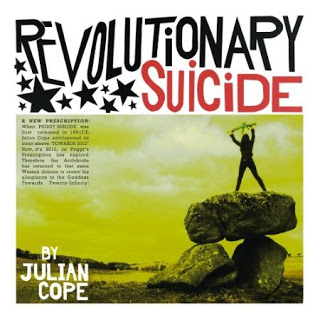Over more than 30 years and a similar number of albums, self-proclaimed Archdrude Julian Cope has steadily travelled further away from the mainstream. Combining revolutionary politics, anti-capitalism, fervent atheism and deceptively simple psychedelia, his music appeals to the loyal drudion but he’s clearly uninterested in rectifying his prolonged absence from the charts any time soon.
Those familiar with Peggy Suicide will know that Margaret Thatcher was something of a muse for Cope, and according to the sleeve notes recording of Revolutionary Suicide finished on the day of her funeral. It’s probably a safe assumption that no tears were shed in the studio – some kind of joyous pagan ritual seems more likely.
After the folky earnestness of the Black Sheep work, and the meditative austerity of Woden, JC is sounding luxuriant again. The usual acoustic guitars, analogue monosynths and mellotrons are supplanted by (fake) strings and horns to great effect. The synths in particular are given pride of place in the mix. This is very much a Cope solo effort – he played all instruments other than bongos, and the drums on one song. For the long-term fan who hopes for something that sounds distinctively Cope, whilst simultaneously somewhat new, this delivers. It’s evolution not revolution – the opposite of his political philosophy.
Opening track ‘Hymn To The Odin’ is reminiscent of Autogeddon but then blooms into a much larger sound as plucked strings, synth drones and massive bass emerge towards the end. It sounds old, but new. ‘Why Did The Chicken Cross My Mind’ proceeds in a stately fashion over a sparse rhythm, reminiscent of Bowie’s ‘Five Years’. The intermittent, tinny Casio melody recalling the oboe lines from Cope’s 80s material and his trademark vocal wah-wah mumblings gradually give way to a gorgeous collision of piano and trumpet sounds at the fade. Lyrically, meanwhile, it’s business as usual:
Though I do protest I’m not a protestant
When I’m someone’s guest I’m never a feisty cunt
When I’m in a country where they worship the duck
I’m careful to never say duck worshippers suck
As has been the case with Cope’s albums for some years, it’s a double CD despite having a total running time that would fit on one disc. The first set is brought to a close with the epic protest song, ‘The Armenian Genocide’. Retaining the acoustic guitars and huge marching bass drum of the Black Sheep material, this is one of the most powerful tracks he’s recorded. Over 15 minutes it evolves like a sombre take on Jehovakill‘s ‘Poet Is Priest’, entwining blissed-out music with narration of atrocities. It’s heartbreaking and beautiful, and sounds like only Cope does.
The second disc opens with the riff-based title track, with unexpected horns evoking Teardrop Explodes’ ‘Reward’ before we are back in the land of punning titles for the excellent ‘Paradise Mislaid’ and then a duo of revolutionary blues songs that could happily blend in on Skellington.
‘They Were On Hard Drugs’ starts by sounding like a reasonably fortuitous random tour through some of the preprogrammed rhythms from a cheap 80s synth overlaid with one-finger keyboards. This naive simplicity is the intro for a psychedelic history lesson about the evolution of humanity that is unlikely to feature in a Michael Gove-approved National Curriculum any time soon (though if the YouTube video purporting to be Cameron raving is genuine, maybe he would be secretly more supportive). Some great lyrical juxtapositions and the underused Cope falsetto make this a standout track, one that worms its way into your head demanding to be sung as you go about your day, which may or may not be ideal depending on your workplace.
The short ‘Phoney People, Phoney Lives’ is dominated by a whistling analogue synth and more marching bass drum, pushing the plaintive vocals further back in the mix. The album then ends with the massively heavy ‘Destroy Religion’, just in case we’ve forgotten his take on theism. Apparently, when not a guest he’s quite happy to say duck worshippers suck. Slabs of doom-laden synth dominate as guitars are quietly punished, while Cope makes great use of the apocalyptic storm sounds that are strewn across Revolutionary Suicide as a whole.
As well as poems and a picture of part of the Cope Revolutionary Dining Set, the booklet features a photo of a dayglo-painted and decal-festooned 4×4 with the number plate hilariously blurred out, as if somehow such a unique vehicle could be made anonymous by obscuring the registration. If you see something matching this description parked near a stone circle somewhere, it’s probably the Copemobile.
It’s a combination of factors that sets this apart from the last few releases. It sounds better recorded, and has a more diverse instrumental palette. Cope’s voice is in great form, and frequently multitracked to produce a rich chorus. The songs are excellent, distinctive and heartfelt, with that beguiling musical simplicity that characterises so much back Copealog paired with razor sharp lyrics. This is his most cohesive and enjoyable album since 1994’s Autogeddon – high praise indeed. Perhaps we finally have something to thank Thatcher for. If you’ve ever enjoyed his solo material, this is very much a recommended purchase.


